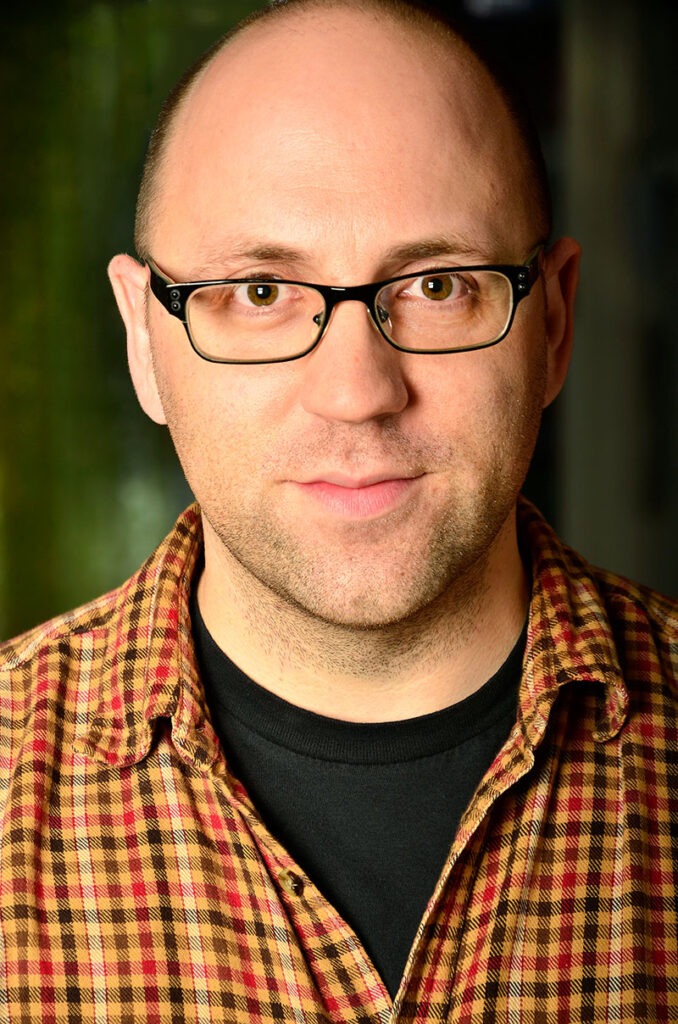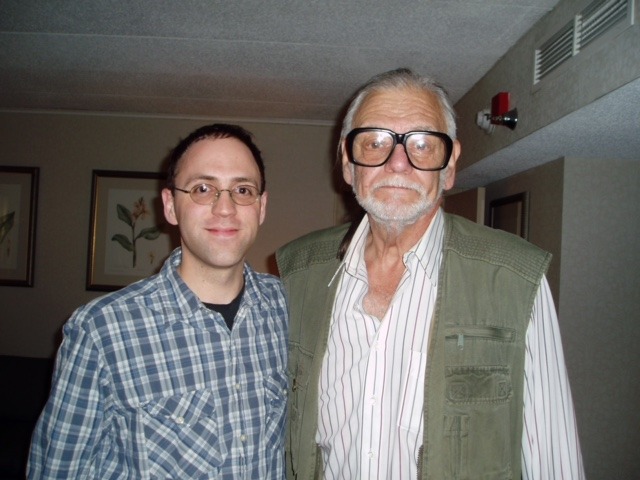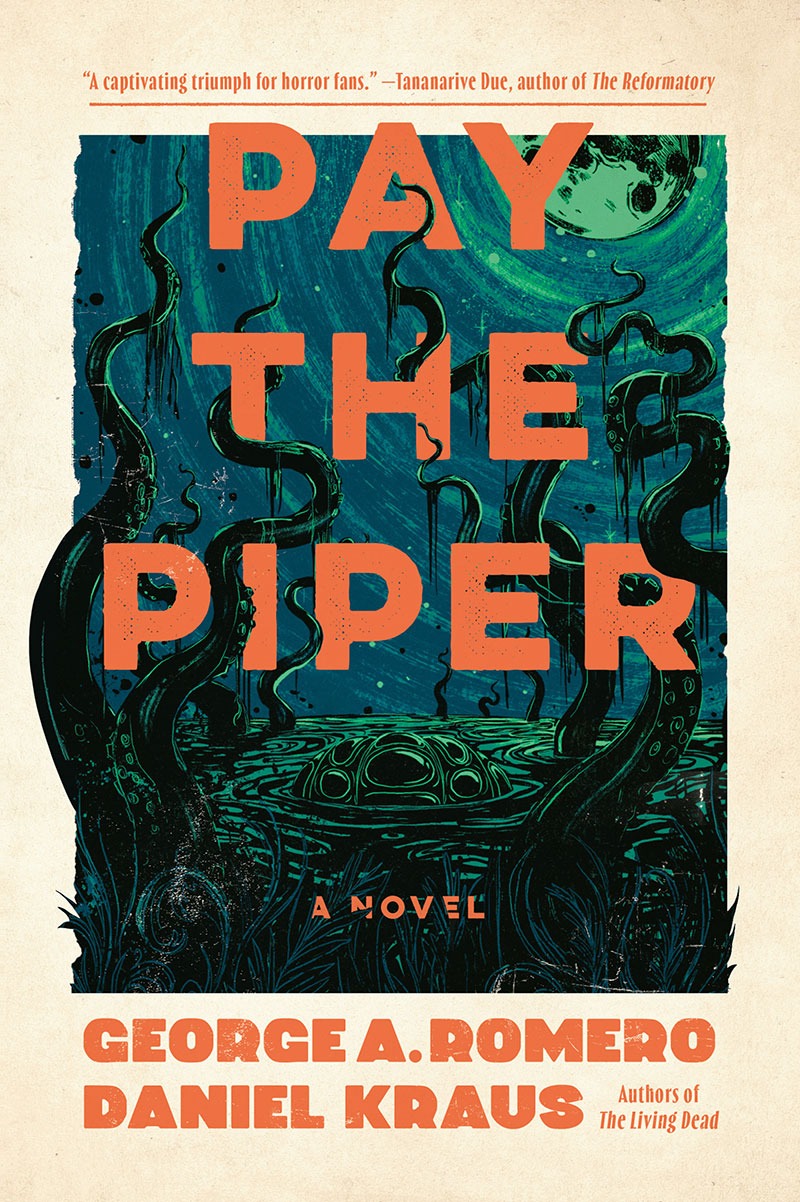They say “never meet your heroes,” but it seems to have worked out well for Daniel Kraus. This horror fan who grew up watching Night of the Living Dead in rural Iowa is now a 49-year-old bestselling author — and his bibliography includes several books co-written with either Oscar-winning director Guillermo del Toro or the godfather of zombie flicks himself, George A. Romero.

A former librarian and longtime Chicagoan who now lives with his wife in Evanston, Kraus says he “got lucky” when he switched careers. “The first book I wrote, The Monster Variations, was actually the first book I got published,” he says. That was in 2009, and in the 15 years since, he’s received high acclaim for his novels — most recently for Whalefall, a compelling aquatic thriller (due out in paperback September 10) that’s already being adapted to film, with Kraus co-writing the screenplay.
But in perhaps his biggest professional “pinch me” moment, he’s become a posthumous collaborator with Romero, who died in 2017. The director’s manager and widow tapped the author to complete The Living Dead, the conclusion to the director’s zombie series released in 2020. Afterward, Kraus stumbled across an unfinished secret project: the partial manuscript of Pay the Piper, a monster tale set in a haunted Louisiana bayou that stretches well beyond Romero’s zombie wheelhouse.
The thriller hinges on real-life past events — specifically stories of the Lafitte brothers, two pirates who greatly aided General Andrew Jackson and the outnumbered American forces at the Battle of New Orleans in 1815. Kraus kicks off a nationwide book tour for Pay the Piper with an appearance at Exile in Bookville Tuesday, September 3, and will also appear at the Printers Row Lit Fest Sunday, September 8, in a panel titled “Hauntings, Magic, and Murder.”
Kraus chatted with Chicago magazine about horror stories and tilling new professional fields.
What did you read when you were a kid? What was your gateway drug into horror stories?
My entry into horror was not books; it was the movie Night of the Living Dead and the TV show The Twilight Zone. I started watching those two pieces of media when I was 5 years old, because my mom was a big fan of both. We watched Twilight Zone weekly, and we watched Night of the Living Dead as much as it was on TV, which was all the time. Because my mom liked it so much, it felt like a safe space. It wasn’t being introduced to horror by your older brother who wants to scare the shit out of you. It was more like, “Come along with me and watch this fun thing.” By the time I was in sixth grade, I was reading Stephen King and Clive Barker.
Did you ever meet George Romero?
I found out by absolute chance that his manager was someone I knew from way, way back. I reached out to him and said, “Hey, let’s get together next time you’re in Chicago.” Shortly thereafter, he was here with Romero for a convention. I hung out with both of them a little bit. That was it; I never saw him again. Ten years later, he died, and then his manager called me up and said, “Hey, we’ve got this manuscript he’d been working on for a long time. Would you be interested in trying to finish it?” By that point, I’d done a couple of collaborations with Guillermo del Toro, so I’d proven I could work well in a collaborative-novel setting.

And how did you come to collaborate with del Toro on Trollhunters and The Shape of Water?
It was pretty straightforward. He had read my book Rotters and liked it. He was looking for a co-author for Trollhunters, so he reached out because he thought I’d be a good fit for that material. I zipped up to Toronto, where he was working on Pacific Rim, and we talked about it, hashed out some details, and that was it. It’s always surprising when someone you admire reads something you’ve done, so it was certainly flattering.
Tell me more about how you came to discover Pay the Piper. You found an early draft in Romero’s papers at the University of Pittsburgh, correct?
Yes. I was excited that they acquired his archives, and I wanted to see what was there. It wasn’t even fully cataloged then. I found Pay the Piper — which wasn’t something anybody knew existed — the last day I was looking through boxes. I read the whole thing, but quickly. It was a lot to take in.
How do you describe the book without giving too much of the plot away?
It’s a folk horror story about a swamp entity down in a Louisiana bayou. It begins picking off residents of this tiny backwater town for something their ancestors did. That’s the short version. I often say it’s reminiscent of Stephen King’s It, but recast into a bayou setting and more historically oriented. The scaffolding of it is based on real-life events. I’d heard of the Battle of New Orleans but knew very little about the Pirates Lafitte.
What was your familiarity with Cajun culture and New Orleans prior to writing this?
Cajun culture? Not much. I’d been in Louisiana several times, and sometime after discovering the manuscript, I went down there. I drove out as far as you can go into the bayou, poking into little restaurants and stuff.
Romero clearly did his research too; the texture and the detail of the book indicate that he knew what he was talking about. But he didn’t leave notes on Pay the Piper. All I had was a big chunk of the manuscript, without any indication of where he was going.
So you had to become a literary Quincy M.D.
Oh yeah. A lot of detective work, a lot of archaeology. He’d have these bizarre, really specific details. They really stuck out, so I’d research them, and sure enough, several times I had a eureka moment where I realized: “Oh, that’s what he was writing about.”
Which authors and directors working in the horror genre do you get excited about?
I’m not situated primarily in the present. I’m always reaching backwards, watching and reading older works more than contemporary stuff. The genre is so deep, with so many facets to it, you can never really catch up. One of my favorite authors I discovered in the past few years is from the Chicago area, Maryse Meijer. I’ve read all her books, which is rare. She’s really exciting. Her last book was called The Seventh Mansion, and it was my favorite from that year.
Let’s say you wake up one day in the near future to the awful realization that the zombie apocalypse is really happening. What are your next steps?
I would run back to Iowa. My dad was a very skilled bow hunter, and I’m sure he still has a lot of weaponry. I figure, in a zombie apocalypse, you’re going to run out of ammo really fast. You want a weapon you can re-use. And of course, it’s probably a good idea to get out of the city.



